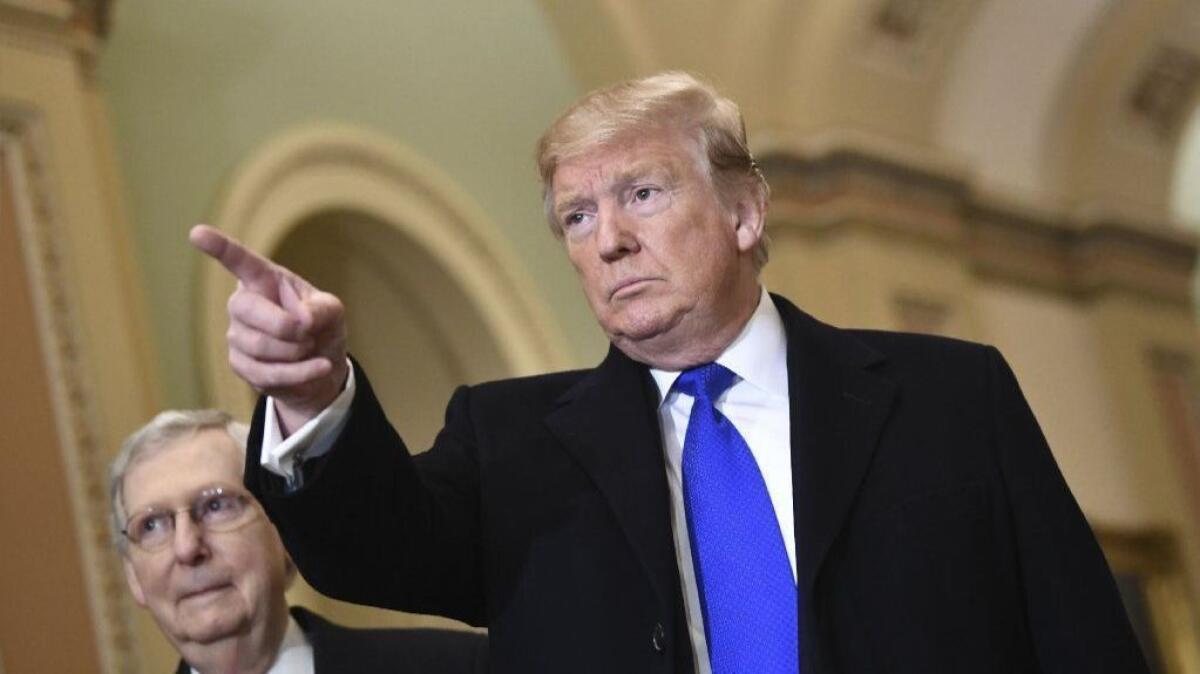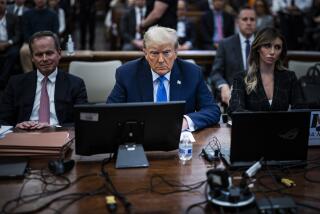As Trump swaggers after Mueller probe’s end, he creates new policy controversies

There was a renewed swagger in the White House this week in the days after Atty. Gen. William Barr cleared his boss, President Trump, of criminal wrongdoing.
Kellyanne Conway, Trump’s outspoken defender, held forth with reporters on the West Wing driveway, decrying the “insult” of allegations that overshadowed the White House for two years. Inside, spokesman Hogan Gidley gleefully marked up the names of the president’s perceived enemies in an editorial cartoon listing them in March Madness-style brackets. And Trump boldly ignored advisors in opening a new fight on repealing Obamacare.
On Thursday, Trump praised Barr’s summary as a “beautiful conclusion” and was celebratory at a political rally in Michigan that night, using profanities to speak of revenge against Democrats and the media. A close ally called it a “new lease” for a president known for defying the conventions of the office.
“There’s no overplaying that,” Steven Groves, a deputy White House press secretary, said of the special counsel’s conclusion that Trump and his campaign did not criminally conspire with Russia in its interference in the 2016 election.
Others, including some Republicans, disagree, believing that Trump and his allies could well overplay their hand. And even as Trump swaggers, the last week has shown yet again that he can trip himself up, given his impetuous decision-making style and disregard even for the flawed policy process of his administration.
Officials are still cleaning up the policy mess days after the president, in a tweet, reversed Treasury Secretary Steven T. Mnuchin’s just-announced sanctions aimed at further squeezing North Korea, baffling lawmakers, allies and foreign policy professionals. His unexpected announcement nominating Stephen Moore, a partisan advocate of Trump’s economic agenda, for the politically independent Federal Reserve Board was controversial enough; then it was reported Moore owes the government $75,000 in debt and unpaid taxes.
But it was Trump’s decision to renew the assault on the 9-year-old Affordable Care Act that most alarmed fellow Republicans, just months after the issue contributed to the party’s election loss of its House majority.
“Most Republicans think they’ve gotten themselves out from under the rock they’ve been under for a year and are now playing offense on healthcare,” said Josh Holmes, a Republican strategist close to Senate Majority Leader Mitch McConnell of Kentucky. “A lot of them feel like they’ve been making incremental progress on coverage and pricing issues. This throws all that out.”
The president, who’d claimed before and after his election that he’d soon unveil his plan to insure all Americans, again urged congressional Republicans to come up with legislation to replace the healthcare law — a goal that’s confounded them for years.
Democrats, meanwhile, continue to point out that special counsel Robert S. Mueller III explicitly did not exonerate Trump of obstruction of justice, according to Barr’s summary, and they are pressing to see the entire report that Barr says is nearly 400 pages long.
“We need to make sure that the entire report is made public and then we can debate the facts,” said Rep. Adam B. Schiff, the Burbank Democrat who heads the House Intelligence Committee.
Yet the emboldened president, newly confident about his political survival, is charging forward — continuing to make decisions quickly following conversations with friends and aides, or a report on Fox News, and often with scant consideration of a long-term strategy or the potential consequences.
Though he praised Barr for his handling of the Mueller report, on healthcare Trump ignored the attorney general’s opposition and directed the Justice Department to file a brief Monday urging a federal appeals court to throw out the entire Affordable Care Act, including its guarantee of coverage for people with preexisting medical conditions.
In a recent meeting with Trump and senior officials, Barr pleaded for a more narrow legal strategy. He argued that a lower court judge’s ruling declaring the healthcare law unconstitutional was flawed and unlikely to stand on appeal, according to an administration official with knowledge of the meeting. Until this week, for months the administration had made the narrower case that only parts of the law were unconstitutional.
Barr argued that the Justice Department is required to defend federal laws that its lawyers believe to be legal and constitutional, whether or not they agree with the statutes. He was backed by Alex Azar, secretary of the Health and Human Services Department.
Mick Mulvaney, Trump’s acting White House chief of staff, who as a congressman was one of the most combative conservatives in the House, took the opposite position. He urged Trump to press the fight against the entire Obamacare law, according to the official, who elaborated on details first reported by Politico. Sen. Lindsey Graham, a South Carolina Republican and Trump confidant, said he made the same case to the president over the weekend when they played golf in Florida.
The decision was such a surprise to Trump’s staff that the Justice Department memo to the appeals court, filed late Monday, was two sentences long.
The uneven process mirrored Trump’s behavior a few days earlier, when he surprised staff with a Twitter announcement that he was lifting new sanctions against two Chinese shipping companies doing business with North Korea, in violation of existing sanctions.
“It was announced today by the U.S. Treasury that additional large scale Sanctions would be added to those already existing Sanctions on North Korea,” Trump tweeted Friday. “I have today ordered the withdrawal of those additional Sanctions!”
His tweet was widely assumed to refer to sanctions Mnuchin imposed a day earlier — and announced with fanfare. National security advisor John Bolton also had publicly promoted the new sanctions.
The tweet undermined both officials’ credibility and, more broadly, risked damaging the United States’ standing among allies, whose support for American sanctions or military threats often is essential to give those policies greater force. Trump’s press secretary, Sarah Huckabee Sanders, said he acted in deference to North Korean leader Kim Jong Un.
“By tweeting it,” Trump “showed the North Koreans that he can be convinced to overrule his national security team, which completely undermines their ability to negotiate,” said Michael Green, a former National Security Council official under President George W. Bush.
Senior officials scrambled to clean up the damage, insisting to reporters that the new sanctions had not been lifted and that Trump was instead referring to yet-unannounced penalties involving North Korea. Yet Bloomberg News subsequently reported that that claim was untrue and that officials made it up to salvage the existing sanctions.
National security officials declined to discuss the matter on the record. At the Treasury Department, which oversees sanctions, an official would only confirm that the sanctions against the Chinese companies remain in place.
Mulvaney seemed to have played a role in this internal dispute as well as the one over healthcare, reflecting what some administration officials say is his newfound influence with Trump.
One administration official, granted anonymity to speak about personnel matters, said Mulvaney was influenced by his foreign policy advisor, Robert Blair. The official noted that Mulvaney has “raised eyebrows” in the West Wing by hiring his own aides, Blair and a communications advisor.
“Obviously, the world is astonished by what they see as a sometimes confusing and what sometimes appears to be a broken decision-making process here in Washington,” said Bonnie S. Glaser, a senior advisor for Asia and the director of the China Power Project at Center for Strategic and International Studies. “I’m still a bit befuddled.”
Times staff writers Del Quentin Wilber and Molly O’Toole contributed to this report.
More to Read
Get the L.A. Times Politics newsletter
Deeply reported insights into legislation, politics and policy from Sacramento, Washington and beyond. In your inbox three times per week.
You may occasionally receive promotional content from the Los Angeles Times.








